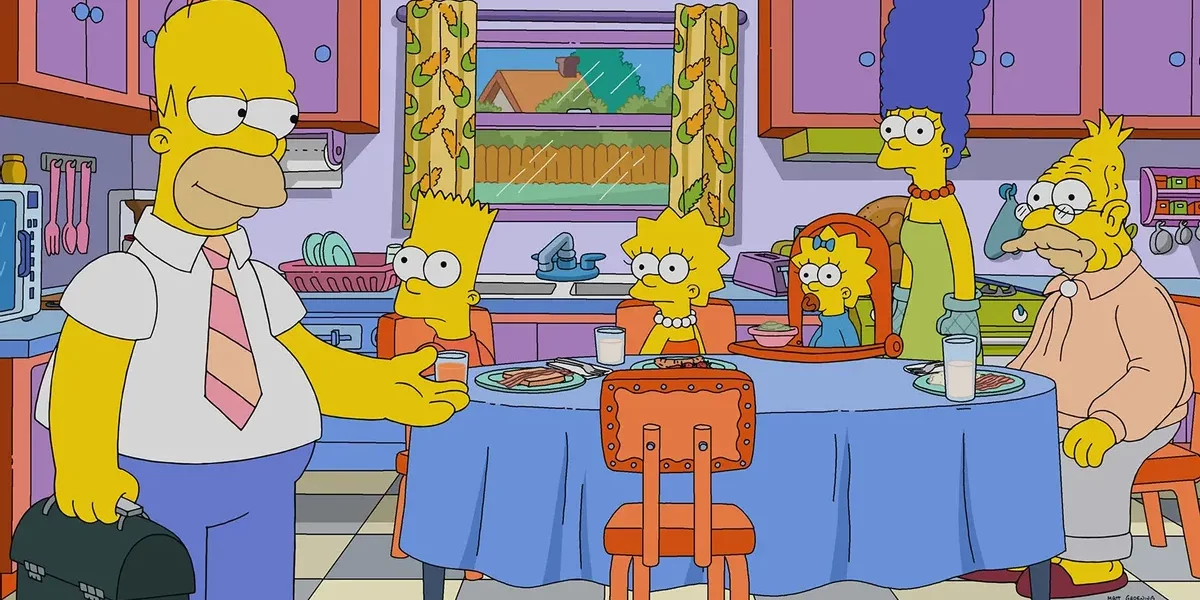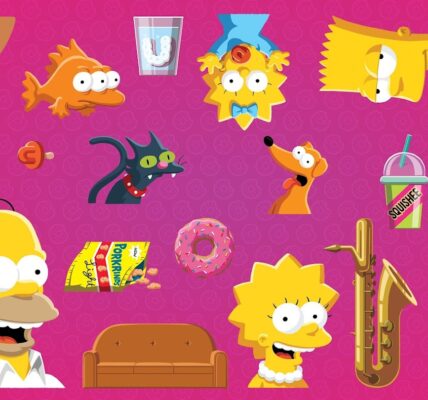Introduction
Death is a recurring theme in “The Simpsons,” the iconic animated sitcom that has entertained audiences for decades. The show’s unique blend of humor and satire extends even to the portrayal of mortality, offering darkly hilarious departures that have become synonymous with the series. In this article, we will provide an overview of death in “The Simpsons,” exploring the show’s approach to this sensitive subject, sharing personal experiences, and uncovering the ways in which the show’s treatment of death adds depth and comedic relief.
1. Comic Deaths: Dark Humor and Satirical Commentary
In “The Simpsons,” death is often presented in a comedic light. Characters face exaggerated and outlandish demises, resulting in moments of dark humor and satirical commentary. From Homer’s numerous near-death experiences to the iconic recurring character, Dr. Julius Hibbert, offering absurdly comical medical diagnoses, the show uses death as a source of comedic relief and as a tool to comment on societal norms and expectations.
2. Iconic Departures: Paying Tribute to Beloved Characters
Throughout its long run, “The Simpsons” has bid farewell to several beloved characters, offering poignant and heartfelt moments. The departures of characters like Maude Flanders, Bleeding Gums Murphy, and Edna Krabappel have not only allowed the show to explore themes of loss and grief but have also provided opportunities for the writers to pay tribute to these memorable personas. These episodes serve as reminders of the impact these characters had on both the fictional world of Springfield and the viewers’ personal experiences.
3. Supernatural and Fantasy Elements: Exploring the Afterlife
“The Simpsons” has also ventured into the realm of the supernatural and the afterlife. Through episodes like “Treehouse of Horror” and “Bart Gets Hit by a Car,” the show delves into imaginative scenarios and alternate dimensions, often involving encounters with deceased characters. These episodes provide a playful exploration of what lies beyond life, infusing the show with fantastical elements that add to its allure.
Personal Experience: Finding Laughter in the Face of Mortality
As a fan of “The Simpsons,” I have experienced the unique blend of humor and contemplation that arises from the show’s treatment of death. The darkly hilarious depictions of mortality have elicited laughter even in the face of a sensitive subject. These moments serve as a reminder of the show’s ability to find humor in life’s darkest moments and offer a unique perspective on the human condition.
Moreover, the exploration of death in “The Simpsons” has prompted personal contemplation and introspection. It has sparked conversations about life’s ephemeral nature, the importance of cherishing relationships, and the inevitability of the unknown. These discussions have added depth and meaning to my experience as a viewer, encouraging me to reflect on the profound messages hidden beneath the show’s comedic façade.
Major Characters Who Died: Farewells and Impact in “The Simpsons” Universe
Introduction
“Major Characters Who Died” have left an indelible mark on the world of “The Simpsons,” the iconic animated sitcom that has delighted audiences for generations. While the show is known for its lighthearted humor, it has also tackled poignant moments of loss and grief through the departure of significant characters. In this article, we will explore the impact of major character deaths in “The Simpsons,” share personal experiences, and delve into the ways in which these farewells have contributed to the show’s enduring legacy.
1. Maude Flanders: A Beloved Neighbor
The death of Maude Flanders, the devoutly religious neighbor of the Simpson family, left an emotional impact on the show’s viewers. In the episode “Alone Again, Natura-Diddily,” Maude tragically meets her end after falling from the grandstand at a racetrack. This loss not only affected the characters within the show but also had a profound effect on fans, who mourned the departure of a cherished and virtuous member of the Springfield community.
2. Bleeding Gums Murphy: A Musical Icon
The passing of Bleeding Gums Murphy, a talented saxophonist and mentor to Lisa Simpson, was another significant moment in the series. In the episode “Round Springfield,” the show paid tribute to this beloved character after his death. The heartfelt episode not only explored themes of loss and remembrance but also showcased the power of music to bring solace and connection in times of grief.
3. Mona Simpson: A Mother’s Farewell
The death of Mona Simpson, mother to Homer and the matriarch of the Simpson family, was a poignant moment that resonated with viewers. In the episode “Mother Simpson,” the show bid farewell to this beloved character, exploring her backstory, the sacrifices she made for her family, and the lasting impact she had on her son’s life. Mona’s departure evoked a range of emotions, from sadness to nostalgia, as fans reflected on the complex relationship between mother and son.
Personal Experience: Nostalgia and Reflection
As a dedicated fan of “The Simpsons,” the deaths of major characters have had a profound impact on my viewing experience. These farewells have evoked a sense of nostalgia and reflection, prompting contemplation about the transient nature of life and the bonds we form with fictional characters. I have found myself emotionally invested in the journeys and relationships of these characters, making their departures all the more poignant.
The show’s ability to tackle themes of loss and grief with sensitivity and nuance has resonated deeply with me. It has served as a reminder of the complexity of human emotions and the importance of cherishing the connections we have, whether real or fictional. These moments have not only added depth to the narrative but have also enriched my personal experience as a viewer.
Minor Characters Who Died: Exploring the Departures in “The Simpsons” Universe
Introduction
“Minor Characters Who Died” have made significant contributions to the vibrant world of “The Simpsons,” the beloved animated sitcom that has entertained audiences for decades. While the show’s main focus is on the core Simpson family, the supporting cast of minor characters adds depth and humor to the series. In this article, we will delve into the departures of minor characters in “The Simpsons,” sharing personal experiences and exploring the impact these deaths have had on the show’s narrative and fans worldwide.
1. Dr. Marvin Monroe: A Therapist Remembered
The passing of Dr. Marvin Monroe, the eccentric therapist who appeared in the early seasons of “The Simpsons,” left a notable void in the show’s universe. Despite being a minor character, Dr. Monroe made memorable appearances, offering humorous and unconventional therapy sessions. Although his character was written out of the series, his legacy lives on, with fans remembering his unique approach to mental health.
2. Frank Grimes: A Tale of Tragedy
Frank Grimes, also known as “Grimey,” was a short-lived character who left a lasting impression on viewers. In the episode “Homer’s Enemy,” Grimes served as a foil to Homer Simpson, highlighting the stark contrast between their work ethics and life circumstances. Tragically, Grimes met his untimely demise, amplifying the show’s ability to address themes of success, envy, and the absurdity of everyday life.
3. Lunchlady Doris: A Culinary Farewell
Lunchlady Doris, the grumpy and sarcastic cafeteria worker of Springfield Elementary School, departed from the show following the passing of her voice actress, Doris Grau. The character’s absence was acknowledged in later episodes, paying tribute to both the actress and the impact Lunchlady Doris had on the show’s humor and dynamics. Though a minor character, Lunchlady Doris remains a memorable part of “The Simpsons” legacy.
Personal Experience: Impactful Losses and Nostalgia
As a devoted fan of “The Simpsons,” the departures of minor characters have left a bittersweet impression on my viewing experience. While these characters may not have received as much screen time as the core cast, their unique personalities and contributions to the show’s humor have left a lasting impact. The deaths of these minor characters evoke a sense of nostalgia, reminding me of the rich tapestry of characters that have graced the series over the years.
Additionally, the departures of these characters serve as a reminder of the talent behind the scenes. The voice actors and actresses who brought these personas to life have left an enduring legacy, and their absence is felt within the show’s universe. These losses prompt reflection on the indelible mark these minor characters have left on the hearts of fans worldwide.
Impact of Character Deaths on “The Simpsons”: Exploring the Emotional Waves and Evolution of the Show
Introduction
The impact of character deaths on “The Simpsons” has been a catalyst for emotional waves and an evolution of the beloved animated sitcom. As the show has navigated the intricate tapestry of Springfield, it has bid farewell to characters both major and minor, leaving a lasting impact on the series and its dedicated fan base. In this article, we will explore the profound influence of character deaths on “The Simpsons,” share personal experiences, and delve into the ways in which these departures have shaped the show’s narrative landscape.
1. Emotional Journeys: Loss, Grief, and Resilience
Character deaths in “The Simpsons” have taken viewers on emotional journeys, exploring themes of loss, grief, and resilience. From the untimely demise of beloved characters like Maude Flanders and Bleeding Gums Murphy to the departures of minor personas, these farewells have touched the hearts of fans around the world. The show’s ability to evoke a range of emotions showcases its depth and its commitment to depicting the realities of life, even within an animated world.
2. Narrative Impact: Unfolding Storylines and Character Development
The deaths of characters in “The Simpsons” have had a significant narrative impact, shaping the show’s storylines and character development. These departures have allowed for exploration of the complexities of the human experience, highlighting the interconnectedness of the characters’ lives and the ripple effects that occur in the wake of loss. The evolution and growth of the remaining characters as they cope with these departures have added layers of depth and authenticity to the show’s storytelling.
3. Fan Reactions and Community-Building
The deaths of characters in “The Simpsons” have fostered community-building and sparked conversations among fans. These departures have prompted discussions about the show’s bold narrative choices, the significance of specific characters, and the impact of their absence on the dynamics of Springfield. Fan reactions and interpretations contribute to the shared experience of watching the show and deepen the connections among viewers who have grown alongside “The Simpsons” over the years.
Personal Experience: Waves of Emotion and Fond Memories
As a devoted fan of “The Simpsons,” the impact of character deaths has left a lasting impression on my viewing experience. These departures have stirred waves of emotion, from sadness and nostalgia to reflection and even inspiration. Witnessing the evolution of the show and the characters I have grown to love has been a journey filled with both joyous moments and heartfelt farewells.
Additionally, these character deaths have fueled personal memories and reflections. They have sparked conversations among friends, reminiscing about the moments that made us laugh or touched our hearts. The impact of these departures extends beyond the screen, creating shared connections and a sense of community among fans of “The Simpsons.”
Fan Reactions to Character Deaths: Unveiling the Emotional Rollercoaster of “The Simpsons”
Introduction
Fan reactions to character deaths in “The Simpsons” have been a rollercoaster ride of emotions, reflecting the deep connection viewers have developed with the iconic animated sitcom. As the show bids farewell to beloved characters, fans around the world have expressed a range of emotions, from shock and sadness to acceptance and even celebration. In this article, we will delve into the fan reactions to character deaths in “The Simpsons,” sharing personal experiences, and exploring the ways in which these departures have influenced the fan community.
1. Shock and Mourning: A Moment of Grief
When a beloved character meets their demise in “The Simpsons,” fans often experience shock and mourning. The unexpected loss of a familiar face can be jarring, as these characters have become an integral part of the viewers’ lives. The initial reaction is often filled with sadness and a sense of disbelief, reflecting the impact these animated personas have had on the emotional landscape of fans.
2. Contemplation and Reflection: Grappling with Change
As the shock of the character’s departure settles, fans enter a phase of contemplation and reflection. They grapple with the reality of change within the show’s universe and assess the implications of the character’s absence. Discussions and debates ensue, as fans analyze the impact of the departure on the show’s dynamics and speculate about future storylines. This introspective phase allows fans to process their emotions and navigate the evolving narrative of “The Simpsons.”
3. Acceptance and Resilience: Embracing the Evolution
Over time, fans learn to accept and embrace the evolution of “The Simpsons.” They acknowledge that character deaths are an integral part of the show’s journey and understand the creative decisions that drive the narrative. This acceptance is a testament to the resilience of the fan community, as they continue to engage with the series and find joy in the new dynamics and storylines that emerge from these departures.
Personal Experience: Riding the Emotional Waves
As an avid fan of “The Simpsons,” I have experienced the gamut of emotions that come with character deaths. The shock and mourning upon the loss of a beloved character were undoubtedly difficult, but they were also moments of introspection and reflection. These departures sparked conversations with fellow fans, as we collectively navigated the emotional waves and found solace in shared experiences.
The fan community’s resilience and ability to embrace change have been remarkable. Accepting the narrative evolution of “The Simpsons” has allowed us to appreciate the creative choices made by the show’s writers and honor the legacy of the characters who have departed.
References: Unlocking the Cultural Tapestry of “The Simpsons”
Introduction
“References” are an integral part of the fabric that weaves together the cultural tapestry of “The Simpsons,” the iconic animated sitcom that has captured the hearts and minds of viewers worldwide. From clever nods to popular culture, literature, and historical events, the show is renowned for its ability to incorporate references that resonate with audiences of all ages. In this article, we will explore the abundance of references in “The Simpsons,” share personal experiences, and delve into the ways in which these references have enriched the show’s narrative and connected with fans on a deeper level.
1. Pop Culture Homages: Celebrating the Familiar
“References” in “The Simpsons” often pay homage to popular culture, celebrating the familiar and invoking nostalgia. Whether it’s a parody of a famous movie, a spoof of a well-known TV show, or a clever wordplay on a popular song, these references tap into the collective memory of the audience, creating moments of recognition and delight. They serve as a testament to the show’s ability to connect with viewers through shared cultural experiences.
2. Literary Allusions: Intellectual Depth
The writers of “The Simpsons” infuse the show with literary allusions that add intellectual depth and intrigue. From references to classic novels like “Moby-Dick” and “The Great Gatsby” to nods to renowned authors such as William Shakespeare and Edgar Allan Poe, these literary references demonstrate the show’s reverence for literature and its commitment to appealing to a wide range of audiences. They provide an opportunity for viewers to engage with the show on a more cerebral level, uncovering hidden layers of meaning.
3. Historical and Social Commentary: Contextual Relevance
“References” in “The Simpsons” also encompass historical and social commentary, reflecting the show’s keen observation of the world around us. By satirizing and parodying significant events, cultural phenomena, and societal norms, the show offers a humorous and incisive take on contemporary issues. These references provide a lens through which viewers can examine and reflect on the world they live in, fostering discussions and encouraging critical thinking.
Personal Experience: Navigating the References
As a dedicated fan of “The Simpsons,” navigating the vast landscape of references has been an exciting and enriching experience. The moments of recognition, the laughter that follows a clever reference, and the subsequent exploration of the source material have added depth and enjoyment to my viewing experience. Engaging with the references has sparked curiosity, leading me to discover new books, movies, and historical events that I might not have encountered otherwise.
Additionally, the references in “The Simpsons” have fostered connections among fans. Discussions about favorite references, debates over their interpretations, and the shared joy of uncovering obscure allusions have created a sense of community and camaraderie. These references have not only entertained but have also fostered a deeper appreciation for the cultural landscape in which “The Simpsons” thrives.
FAQ: Simpsons Characters
Who is the mob boss character in “The Simpsons” known for his organized crime activities?
Fat Tony is the mob boss character known for his involvement in organized crime.
What is the name of Marge Simpson, the wife of Homer Simpson and mother of Bart, Lisa, and Maggie?
Marge is the name of Homer’s wife and the mother of the Simpson family.
Can you identify the character who is a famous TV clown and the host of “The Krusty the Clown Show”?
Krusty is the famous TV clown and host of the show “The Krusty the Clown Show.”
Who is the friendly neighbor of the Simpsons family, known for his devout religious beliefs?
Ned Flanders is the friendly neighbor of the Simpson family, recognized for his strong religious values.
Which actress, known for her role as Edna Krabappel, tragically passed away in 2013?
Marcia Wallace, who portrayed Edna Krabappel, tragically died in 2013.
What refers to the list of the most significant characters in “The Simpsons” series?
The top 10 major Simpsons characters are the most significant and recognizable characters in the show.
In which season did several characters die tragically, including Maude Flanders?
Season 11 of “The Simpsons” featured tragic deaths of several characters, including Maude Flanders.
Which episode of “The Simpsons” is referred to as “The Simpsons 138th Episode Spectacular”?
The episode “The Simpsons 138th Episode Spectacular” is known as the 138th episode of the show.
Who is the creator of “The Simpsons” and also voiced characters like Homer Simpson?
Matt Groening is the creator of “The Simpsons” and has also provided the voice for Homer Simpson.
What role does Chris Ledesma play in relation to “The Simpsons”?
Chris Ledesma is the composer who created the show’s iconic theme music.
Which episode of “The Simpsons” is referred to as “The Simpsons 138th Episode Spectacular”?
“The Simpsons 138th Episode Spectacular” is the title of an episode of the show.
What is notable about some characters in “The Simpsons” series, indicating that they have passed away?
Some characters in “The Simpsons” series have died over the course of the show’s run.
In which season of “The Simpsons” did several characters experience their demise?
Season 10 of “The Simpsons” featured the deaths of several characters.
What is the commonly used informal title for the long-running animated TV series “The Simpsons”?
“The Simpsons” is often referred to simply as “The Simpsons.”
Who is the father of Krusty the Clown and the Rabbi of the First Church of Springfield?
Hyman Krustofsky is the father of Krusty the Clown and the Rabbi of the First Church of Springfield.
When is the year 2022 relevant in relation to “The Simpsons”?
The year 2022 is relevant to “The Simpsons” in terms of its episodes and events.
Who is the character known as “Glick” in “The Simpsons” series?
“Glick” is not a known character in “The Simpsons” series based on the provided information.
Which actor, known for his voice work on “The Simpsons,” tragically passed away in 1998?
Phil Hartman, known for his voice work on the show, tragically passed away in 1998.
In which season did “The Simpsons” release its 22nd season?
“The Simpsons” released its 22nd season as part of the show’s long run.
Who is the mischievous son of Homer and Marge Simpson in “The Simpsons”?
Bart Simpson is the mischievous son of Homer and Marge Simpson.












